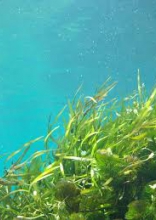
The SeaConomy project, founded with the support of iCleantech Vlaanderen, brought together a multidisciplinary consortium to investigate the feasibility of sustainable seaweed cultivation in the BNZ. The partners: Colruyt Group, Lambers-Seghers (feed), POM-West Flanders, Pures (food supplements) and Sioen Industries (textiles) represented the various links in the seaweed chain, from cultivation to consumption.
The SeaConomy project worked around three objectives:
Now that the SeaConomy project has been completed, the findings have been translated into a vision text which should encourage the Flemish actors to continue building on a Flemish seaweed chain. This vision text was presented yesterday at the Living Tomorrow site in Vilvoorde to the Flemish Minister for Environment, Nature and Agriculture, Joke Schauvliege.
The vision text shows that our North Sea is extremely suitable for the cultivation of various seaweed species with economic potential, e.g. Atlantic wakame, sugar seaweed, bladder wrack, sea lettuce, dulse, etc., which already occur naturally in Belgian waters.
Various SMEs and knowledge institutes in the food, feed and agribusiness are also showing a growing interest in the commercial use of seaweed. According to the report, this is due to the broad applications of seaweed and its characteristic properties, including: the unique taste, freshness, color palette, unique chemical composition, etc. Partly because of these characteristics, the vision text sees the most potential for seaweed as an additive in food and feed in the short term. The addition of seaweed for sustainability matters is possible, provided that all or part of the protein sources currently used are replaced and provided that large volumes of seaweed can be marketed at low cost. To achieve this, however, research and development will still be needed for several years to come, mainly on the stabilization of seaweed and spatial use.
The SeaConomy consortium now hopes that this vision text and various projects will create sufficient momentum to build a small-scale, sustainable seaweed economy by 2025, based on native and commercially grown seaweed on the BNZ, which will be used as an additive in food and feed. An ambitious development project would then turn Flanders into an international knowledge hub for seaweed by 2035, including cultivation on an industrial scale and bio-refinery.
To help realize this vision, the SeaConomy partners will meet again at regular intervals and commit to integrated farming, the development of energy-efficient techniques, the creation of public support and the potential of seaweed as a sustainable raw material to further explore, and set up and support follow-up initiatives to this end. These follow-up initiatives should build on knowledge from pilot projects both at national level (Aquavalue, roadmap for integrated aquaculture, 2014-2015), Coastbusters (seaweed as an element in a natural coastal defense mechanism, 2017-2020), Edulis (mussel farming within offshore wind farms, 2016-2018), Value@Sea (pilot project for seaweed farming, oysters, mussels and scallops off the coast of Nieuwpoort, 2017-2019) and other European and foreign initiatives. It will also be possible to benefit from innovative aquaculture projects resulting from the Blue Cluster.
To support this development, six search zones have already been identified and proposed for the Marine Spatial Plan (2020-2026). Within one of these search zones, the Value@Sea project is already running.
For more information about the SeaConomy project: http://www.fabriekenvoordetoekomst.be/seaconomy
For more information about aquaculture in Flanders/Belgium: